Geographical Cultural Ethos → science is dead
Could physical geography be a key factor in the indigenous development of the most salient distinguishing facets of cultural ethos that differentiate Western versus Eastern societies?
Let’s attempt to decipher the post-mysticism psychology in terms of group advancement. We’re delving into the essence of the evolution of the constitution of human nature.
Is the interaction of these distinguishing facets with (the otherwise seemingly inexplicable prevalence of) individually irrational psychology of ressentiment, essential for formation of the group ideology capable of groupwise adaptation? Is ressentiment the only paradigm by which society-at-large can overcome the defection of clannism to maximize cooperative large-scale group adaptation? And if so, what are the ramifications and outcomes? After those, I will explore in Part 2 how this relates to our perception and conceptualization of our existence w.r.t. theories of our universe.
Reality of Idealism
This (mostly subconscious) ressentiment is the stumbling block of our iniquity because of our lust for a material or measurable (e.g. scientific) validation of our existence is an idol which replaces the need for a love of God and God’s creation including all of his children.
The wicked amongst the rich have a Babylonian ressentiment of God instead of a righteous stewardship of the economy for the benefit of all of God’s creation.
I observed the following qualities amongst the masses: wretched laziness, egalitarian unfairness, covetousness, envy, jealously, vengefulness, and especially the nearly universal (i.e. low entropy) desire to replace liberty with a false sense of security (i.e. replaced with insecurity). This lust for control (in defiance of a deference to God) is even observed amongst those who claim they want to protect all of nature such as the other humans, animals, and plants. Thus laziness, covetous politics, and lust for a stable earthly existence even manifests as the inability of the majority of humans to objectively reject the trauma-based mind control of psychological warfare false-flag conspiracies. Those aforementioned attributes unite them as a collective group to gang up in socialism or Communism to attempt to redistribute[steal their share of] the wealth. But this destroys the righteous stewards, creates a power vacuum that rewards the wicked who grab power, and plunders the economy as per the examples of the (hyperinflationary) outcomes of Communist revolutions and the expropriation of the white farmers in Zimbabwe (and now South Africa) which created destitution and famine from which was formerly a breadbasket of Africa. Even just a peaceful, modicum of socialism placates, validates, and thus promotes an insidious ressentiment which will eventually become as violent and destructive as its underlying psychology.
Mechanisms of our measurable (aka fungible) existence such as judgement, wealth, falsifiable science, and conspicuous consumption aren’t inherently evil. They facilitate the development of humankind to a potentially higher-order, non-fungible, idealized existence (to be explained in the final section of this blog). Conversely, (group-wide) asceticism (thus reducing demand for production) isn’t inherently righteous per the wickedness of the non-stewardship of burying the talents in the ground. Ethical distinction is in the piety of the heart and intent. Righteous forms maximize stewardship efficiencies and economic outcomes whilst minimizing or at least not intentionally promoting the demand for a ressentiment-based lust for an enviable, self-righteous existence.
Righteous Idealism vs. Selfish Delusion
Righteous idealism is achieved by delegating to God as the sole judge. Thus relieving the meek of the futility of fighting an insoluble or Kafkaesque plight such as: the seemingly inexorable power-law distribution (1, 2, 3, 4, 5, 6, 7) of wealth, power, and the merry-go-round corruption thereof.
Whereas, the psychology of ressentiment replaces the bitterness of resentment for one’s plight, with a delusional, selfish illusion of righteous superiority or control over the situation such as: a focus on Christianity as exclusionary, vindictive, apocalyptic Revelation, and promise of salvation that the faithful meek will inherit the glorious earth upon the return of Jesus whilst the selfish rich suffer damnation in eternal hell. And our smug vengefulness could be mistakenly supported by Jesus purportedly stated that a rich person that hadn’t given all his possessions to the poor had less chance to pass through the gates of heaven than an elephant (or camel) through the eye-of-a-needle. Nietzsche’s conceptualization focuses on the irrationality from an individual perspective but afaik doesn’t consider the groupwise benefit from squelching defection:
The ascetic ideal in this scenario for Nietzsche springs from the protective instinct of a degenerating life. If life is not rewarding in the current climate, it makes sense to alter the perception of life until it does. Nietzsche claims the ascetic ideal arises everywhere, in various cultures around the World starting from someone against life – someone he describes as being sick. This sickness allows such people to accept hardship and sickness, glorifying it through spiritual means. The sickness arises from the pity of the state of Humanity, damning the strong who thrive through the hardship and claiming they are evil by what they represent. The idea of sickness is well worked as it links to the first essay, the slave master morality sets up the strong as wrong and the weak as good and pious. Evidently it is also contagious, as propagated by the ascetic Priest to the herd it will only spread. Nietzsche moves on to highlight the relationship between the ascetic Priest and the sick masses. The ressentiment of the herd blames the values of the strong for their suffering, and ideally the ascetic Priest forefronts their ressentiment by advocating a formation of religion. It redirects this ressentiment whilst helping the herd maximise their will to power, despite succumbing to the deafening of their own will to will for this nothingness. Nietzsche describes this as an orgy of feeling, a compilation of guilt, bad conscience, slave morality and denial of the will – in order to elude oneself to feel the will to power. Nevertheless he claims the sick become even sicker through such methods.

The Evil Wiki: Witch-Hunt
Nietzsche’s “God is dead” observed that this zeitgeist of subconscious subversion of rational will, constituted a catastrophe for European culture that would oscillate wildly between extreme idealism and nihilism. Examples include witch hunts. And more recently embodied in the “virtuous”, inane idealistic lie of anthropogenic (i.e. man-made) global warming, is the premediated, intentionally massively corrupt, with intertwined vested interests, self-imposed population culling due to misdirecting focus and resources. The irony of the ressentiment-based insanity being that global warming is associated with human prosperity; whereas, the (rapidly approaching) global cooling is historically correlated with civilization collapse and pestilence.
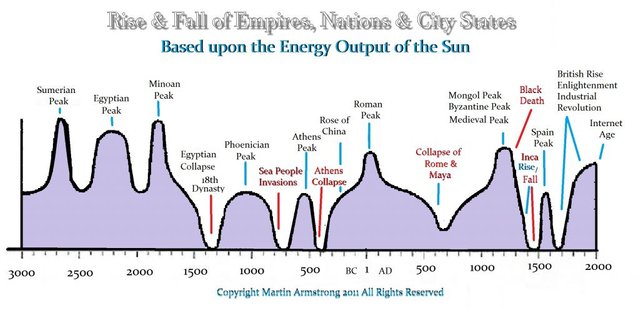
Rise & Fall of Empires, Nations, City-States: Based on the Energy Output of the Sun
Geographical Model of Cultural Ethos
My first clue:
“why are Western cultures monogamous?” [female eggs are rare, male sperm is in oversupply] […] intensive polygyny by wealthy, powerful males is an optimal male strategy […] elite males of all of the traditional civilizations […] including those of China, India, Muslim societies […] often had hundreds and even thousands of concubines. In sub-Saharan Africa, women were generally able to rear children without male provisioning, and the result was low-level polygyny in which males competed to control as many women as possible […] Under such harsh conditions […] one might expect to find that the population would develop a strong tendency toward monogamy
The chart below seems to show a correlation between the length of male genitalia (as a proxy for prenatal testosterone level) and the relative isolation from competition for females. From an evolutionary psychology and biology perspective, females (at least in their ancestral environment) wish to be captured and raped by invaders or the most violent men.

Average penis size
The relative openness of the physical geography to war, disease, pandemics (c.f. also), and invasion, might be the dominant political-economic recipe in the indigenous development of the the collective consciousness of Western Europe:
- ressentiment-based idealism manifests as top-down anti-competitive socialism
- non-righteous monotheism is psychological ressentiment, i.e. will-to-power illusion of control via asceticism2: man-subjugates-nature
- confrontational frankness and individualism manifests as bottom-up competitive
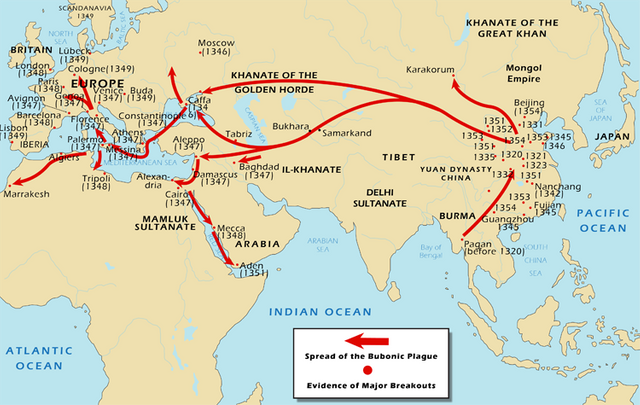
Black Death routes from Asia
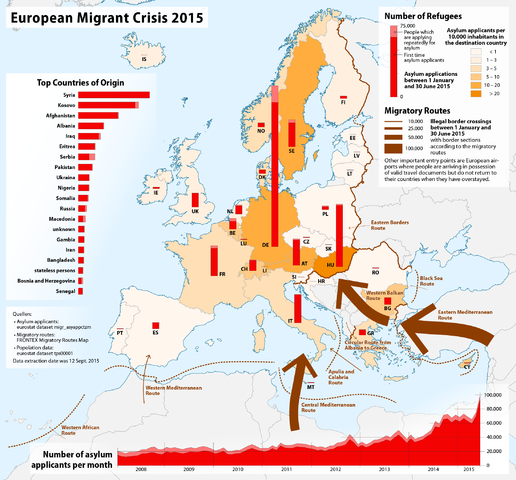
European migrant crisis routes

The roots of this refugee crisis go back even further than the Arab spring
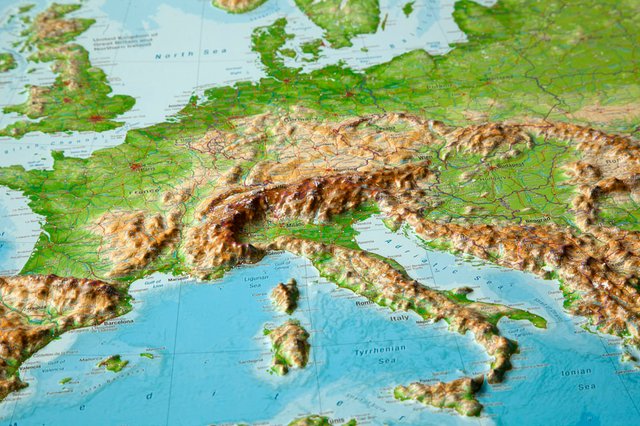
3D Topographical map of Western Europe
Conversely, the geographic isolation due to the relative impermeability (to invasion)1 of the land borders of China and Japan, appears to derive the Northeast Asian ethos:
- rational realism manifests as bottom-up competitive patronism
(small-scale adaptation but large-scale rigid, ossifying) - non-righteous pandeism/pantheism is psychological fatalism2, i.e. acknowledgement of what can’t be controlled: nature-subjugates-man
(large-scale adaptation periodically requires ressentiment-based mass insanity such as Communism) - sycophantic chicanery3 and social hierarchy manifests as top-down anti-competitive
(capitalism, and not collectivism as the idealism of socialism)
Stability instead of flexibility became the dominant geopolitical-economic recipe after a period internal wars in China to settle the internal power vacuum. My understanding is that the Asian philosophies (religions?) being non-monotheistic (i.e. non-idealistic), don’t implore individual responsibility for stewardship over wealth. Without an eternal hell in afterlife, there is only collective punishment when the society collectively fails then the leaders are overthrown by ressentiment-based rebellion because the leaders have lost the consent of the heavens (such as in the fall of Ming Dynasty due to famine caused by a Maunder Minimum). In short, righteous individual idealism (aka non-socialist altruism which is the antithesis of kin altruism) doesn’t exist (c.f. more evidence) in predominant indigenous Asian cultural ethos as far as I can see (and note I’ve lived in Southeast Asia and visited Hong Kong, so my experiences match those links I provided). Yet the non-righteous, ressentiment-based form of Western idealism fails to adopt unselfish stewardship because of the lust for social justice instead of righteously delegating punishment to the afterlife.
In the Middle East, Islam lacks (c.f. also) a consistent interpretation of hell as being eternal, promotes duplicity with the caveat “God willing”, and the “idealism” includes a bribe offering lavish wealth and 72 virgins (c.f. also) obviously targeting the Eastern reverence for concubines:
Similarly, in Japan, there are a few private clubs where the girls are virgins and if you wish to select one, and she agrees, you paid $250,000+ and she was yours. You then had to provide her an apartment in Tokyo and support her as a concubine. She would be there for you whenever you were in Tokyo. They did this to be taken care of and a portion of the money always went back to her family. There are different cultures around the world and different morals.

3D Topographical map of China
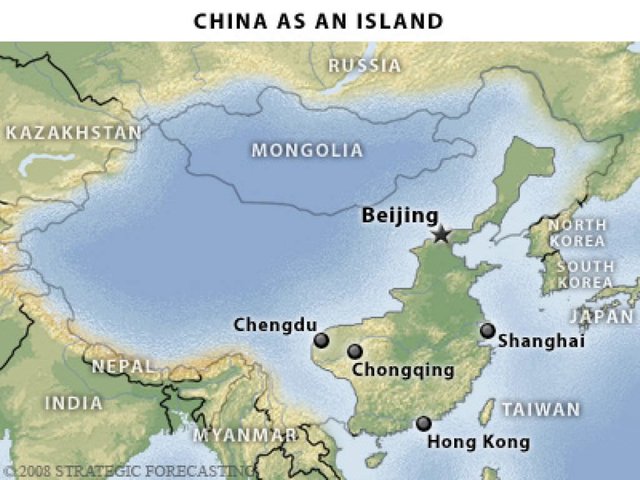
The Geopolitics of China: A Great Power Enclosed
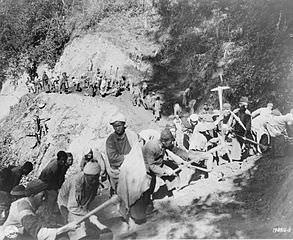

With cooperation and alliances in the south and with Eastern Europe on the east, Western Europe was defensible against Arab and Mongolian invasions. The mud, bitter cold, and fatalistic unrelenting fight of Russians provided a sufficient barrier motivating a sane stalemate between Western Europe and Russia which stymied both the Nazis and in the other direction the the Mongols in conjunction with heavily armored knights, stronger horses, fortified castles, and thick forests. Russia, Eastern Europe, southwest Italy, Greece, and southern Spain were the buffer zones of (Arab and Mongolian) invasion and cultural cross-pollination.
Russia Adopted Asian-like Patronage Mixed With European-like Monotheism
Russia was thus relatively isolated from invasion by Eastern Europe acting as a buffer zone on the southwest, mountains on the southern border, and Siberia to the east. This relative isolation was analogous to China. The major external threat for both nations being a successful invasion and rule by the Mongols. Analogous to failure of other attempts to invade Russia, Japan was unable to sustain or attain dominion over China even after massacring hoards of Chinese. And due to its extreme xenophobia, Japan didn’t have the option of attempting a long-term integrative dominance of the Chinese.
Russia adapted to the Mongol invasion analogously (yet with ressentiment basis) to China’s much earlier adoption of Confucianism (which is not based in a “loony” ressentiment) to pacify its clans under a hierarchical power sharing. This squelching of defection into a pseudo-homeostasis within the nation, fostered economic development that expanded the pie for all clans. Additionally it enhanced resistance to external threats by subsuming the invasion strategy of divide-and-conquer alliances with clans against other clans.
Russia adopted an urgency to force ubiquitous autocratic control and achieve re-unification of its territory. This goal was aided by fostering the dominance of the extant Orthodox Christian church (which had also been exploited by the Mongols for the capitulation and organization of the conquered Russians) in conjunction with the opportunistic viral spread of Christianity’s placation of the pervasive ressentiment that had resulted from the shock and humiliation of being suddenly dominated by pastoral, nomadic, steppe people.
Into the power vacuum of this fatalism stepped the iron fist of a debilitating state-run oligarch economy. That continues until present day w.r.t. mix of fatalism and centralized control over religion. The Mongol influence on Russia and Eastern Europe is a source of the “East-West divide of Europe” (including the East-West Schism between the Roman Catholic and Eastern Orthodox religions), because that influence didn’t penetrate into Western Europe. Yet by the 20th century a power vacuum was forming. Russia was dysfunctional, fragmented, and the global elite were abetting (c.f. also) the Communist revolution. The corruption of the oligarchs even became intertwined (2, 3, 4, 5) in the corruption of (1, 2, 3, 4, 5, 6) the “permanent unelected government” of the U.S.A.. By 1970s the KGB defector Yuri Bezmenov explained (c.f. also) the synergistic, mutual (between Russia and the West) exploitation of ressentiment-based (i.e. non-righteous) Western idealism to further elite control.
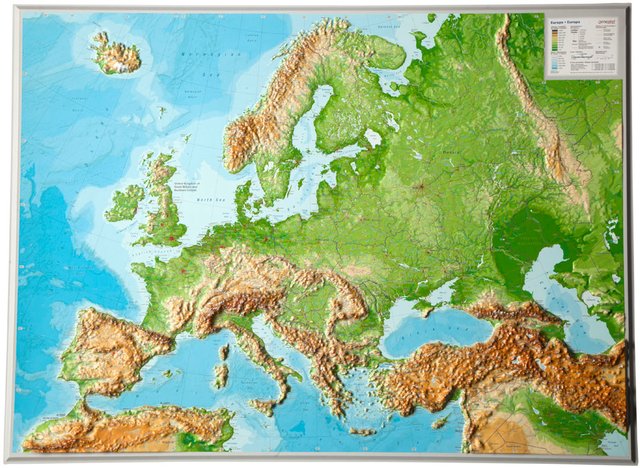
3D Topographical map including Eastern Europe & Russia
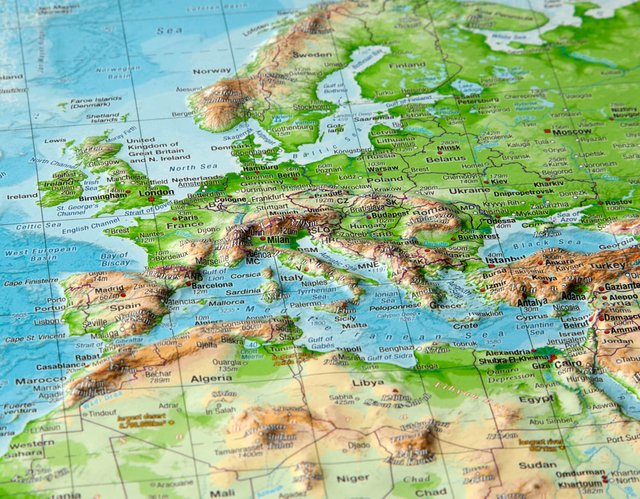
3D Topographical map including Eastern Europe & Russia

3D Topographical map of the world
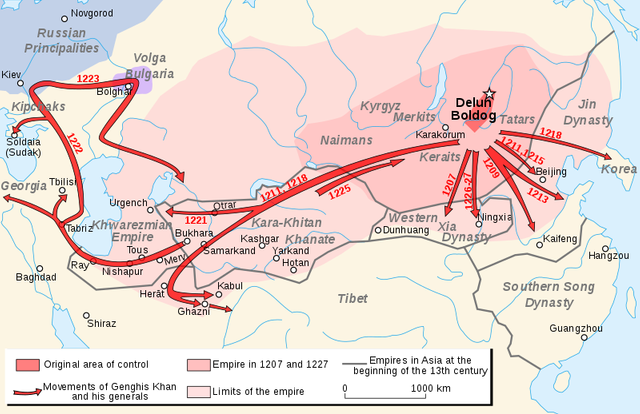
Mongol invasion of Europe
Economic Evolution Selects for Defection Fitness
(Steemit limits the maximum length of a blog)
…continued in Part 2… Click here to go read Part 2…
1 The Ming Dynasty refortified the Great Wall against the Mongolian invasions, but Manchurians bypassed the wall with bribes combined with Maunder Minimum induced famine, rebellion, and chaos such as the Seven Kill Stele that weakened the Ming Dynasty.
2 Asceticism and fatalism shouldn’t be conflated with philosophical sublimation via higher-order understanding and conceptualization such as karma.
3 In China, “…the tall poppy syndrome. As long as you did not stick your head up above the crowd you were fine.” The three Chinese curses. Japanese proverb, “The protruding nail will get hammered down.”
Disclaimer: this compendium is a rushed attempt to synthesize a holistic analysis of human history incorporating theology, abstract math, and to some extent the scientific method. Due to the lack of available time to apply to this extremely ambitious and complex endeavor, this is a work in progress which is subject to change as I become aware of new facts and facets of analysis. I’ve tried to contemplate falsification, alternative explanations, and the predictive value of the theories discussed. Yet I’m aware I didn’t have sufficient time, energy, health, youthfulness, and reflection time to do this exhaustively and systematically. Rather than seek perfection before publishing, open source theory of maximizing trade within the inverse commons, instructs me to publish early, publish often, and iterate.
All the links in this blog has been archived at archive.is and/or archive.org.
Thanks for the post. Would you mind posting a price chart update? You seem to have been pretty spot on in predicting a march drop to ~5.9-6.4 at one point, but I'm not sure you stuck with that prediction?
https://steemit.com/trading/@anonymint/houston-the-rocket-has-lifted-off-the-launch-pad
Nice :)
I found relevant commentary about a visit to Venezuela in 1998 by Eric S. Raymond, the purveyor of the term ‘open source’, which relates Venezuela’s geographically abundant (extractive and naturally occurring wild food) resources to the culture that developed as a result.
Interestingly it predicted the economic collapse of Venezuela that is ongoing now and it predicts the coming economic collapse of the U.S.A. due to deviation from the Anglo-Saxon Puritan work ethic (mentioned in Part 2 of my blog above) to the underlying ressentiment-based ideological delusion that my blog above is about:
Excellent comment by @h0bby1 which he wrote one of my other blogs, also applies very much to this blog. Highly recommended to click that link and read his comment.